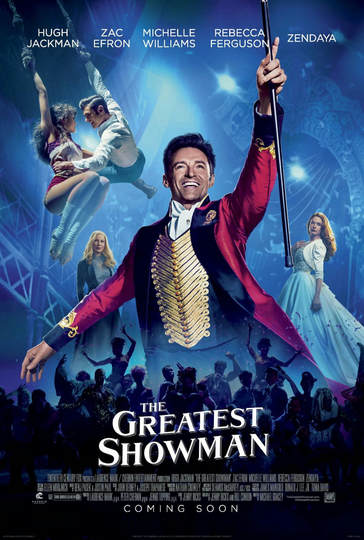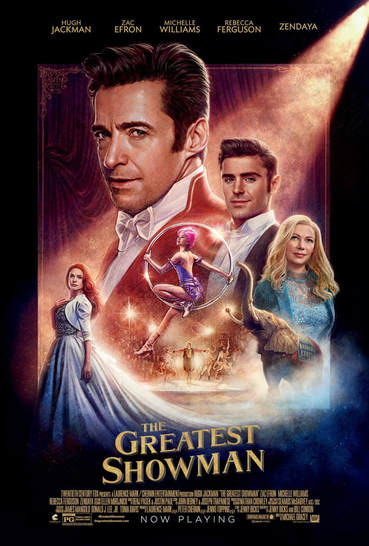 Official movie poster (20th Century Fox)
Official movie poster (20th Century Fox) Overall: The storytelling is a bit rushed, but it's an entertaining and uplifting "celebration of humanity"
If you haven't heard already, Michael Gracey's The Greatest Showman is very loosely based on the life of P.T. Barnum, the legendary circus ringleader. Looking at the film's inspirational themes, and the vast liberties taken with the facts, it's clear making another biopic wasn't the intent. Instead, screenwriters Bill Condon and Jenny Bicks use the symbolism of Barnum to remind us to dream, show benevolence and focus on what matters.
We watch Gracey's Barnum from his youth as a misfit (Ellis Rubin). He copes with the bleakness of his poverty-stricken life with imagination, charm and humor. He hopes to one day show up his elitist naysayers by wowing and entertaining the world. When of age (Hugh Jackman), he marries his childhood sweetheart (Skylar Dunn; later Michelle Williams), who happily leaves her lap of luxury to be with him. "Barnum's Circus" is eventually launched, piquing both interest and protest for making stars out of outcasts. The lineup consists of performers exiled for their physical appearance. To appeal to the upper-class, P.T. recruits a more traditional act: a glamorous singer named Jenny Lind (Rebecca Ferguson). He also enlists the help of a wealthy playwright, Phillip Carlyle (Zac Efron). Phillip's budding romance with Anne Wheeler (Zendaya), a black trapeze artist, tests them both in different ways. Things also get sticky between P.T., his wife and Jenny. It all comes to a head as his obsession with raising the show's profile gets the best of him, and the performers are attacked.
As with any proper musical, the songs strike the emotional chords of the story and sharpen its tones. Holding the defiant and aspirational spirit of the characters, each track is stirring. So much so, you'll forget you're watching a movie and will clap by reflex at the end of numbers. This is particularly true with "Never Enough" and the outsider anthem "This Is Me," beautifully led by 'bearded lady' Keala Settle. "Never Enough" marks a 'make or break' instance for P.T. He's hired Jenny by word-of-mouth alone, and has promised awe to cynical crowds with her debut. I myself was prepared to be unimpressed. I thought "I'll accept this for the pivotal scene it's supposed to be, no matter how unremarkable it is." My breath was taken away right with the fictional audience. Recall the first time you heard Adele's "Someone Like You," Celine Dion's "My Heart Will Go On," Whitney Houston's cover of "I Will Always Love You" or Mariah Carey's "Vision of Love." Those kinds of memories will flash before you. Perfect diva science was smartly applied to create the desired effect. You know the formula: sweet lyrics, stunning vocals and 'just right' structuring to where the song escalates, but never crushes its own tenderness. The chops were provided by Loren Allred, who appeared on season 3 of NBC's The Voice (it's awkwardly noticeable that Ferguson is lip-synching). I think it's unfortunate (and a little strange) that a dual actress/singer wasn't cast as Jenny. This way, the architect of such an wonderful moment was left out of the party.
 (20th Century Fox)
(20th Century Fox) While the music accentuates the plot, not all the blanks are filled in. Showman's weakness is its hurried and abbreviated tale-telling. For example, a passionate argument between P.T. and Jenny almost comes from nowhere. Prior to, we're only given droplets of context about their relationship. Additionally, the spat and its fallout are split-second. Sugarcoated racial dialogue and limited screen-time for Phillip and Anne result in missed opportunities for drama and powerful social commentary. Zendaya makes the most of her space, however, with a distinctive, captivating and suave performance (among other things, I was in love with her convincing southern drawl). The circus acts are the heart of the film's moral and they make everything "Come Alive," but sadly, they're mostly ornamental. We don't learn much about them and their key minutes are succinct. Being shunned by Barnum himself is the catalyst for "This is Me," but that's the extent of the scene. He's never held accountable for his demeaning actions. In point, they continue working for him, and help him get back on track at the end, which also comes at us fast.
In the conclusion, a long-time critic of Barnum finally offers praise, saying his show is a "celebration of humanity." Despite the movie's summarizations, you get the ideas. You're thoroughly invested, uplifted and entertained. As blogger Katherine Fox wrote: "If you need a reminder that you are in this world with talent and purpose that nobody else has...If you need to be reminded to take risks, to pursue your passions, or to just dream again, go see The Greatest Showman. Now." Several reviewers slammed Gracey, Condon and Bicks for choosing a parable over a harder-edged biography. They called it sentimental hogwash, sappy, cheesy and Disney (the last adjective is likely a petty dig at Efron and Zendaya for being 'House of Mouse' alums, which is nothing to be ashamed of). The fact that such a elevating, positive film is getting knocked for being so, just proves its necessity.


 RSS Feed
RSS Feed